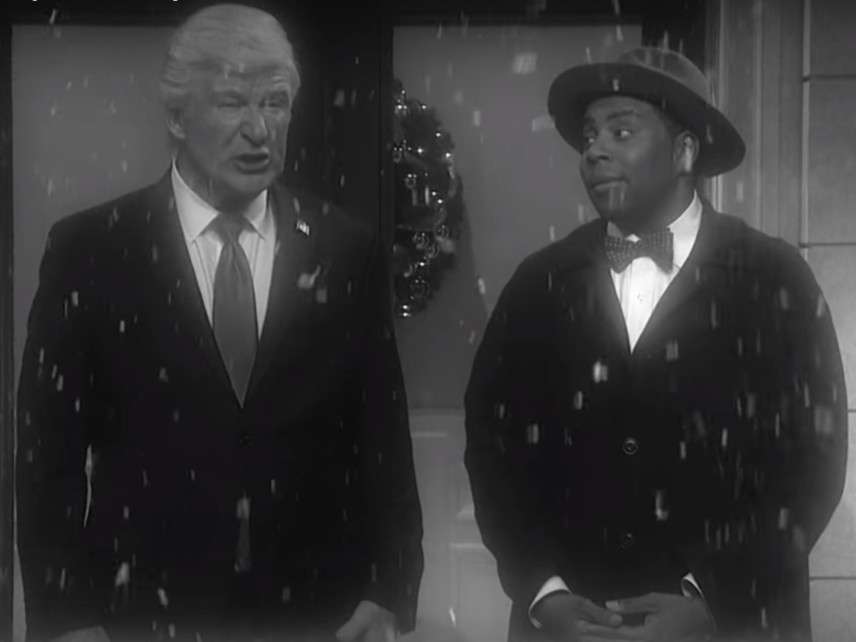Trump Keeps Wondering Why People Are Allowed to Make Fun of Him on TV
The "equal time" rule does not mean what the president thinks it means.

Although Donald Trump describes Saturday Night Live as "unwatchable," he keeps watching it, and he keeps wondering why the show is allowed to make fun of him. While Trump is no doubt trolling his opponents with these tweets, he also seems genuinely confused about regulation of broadcast television—in particular, the "equal time" rule, which he erroneously views as a general requirement of balance or fairness.
On Saturday, NBC re-aired an SNL episode from last December that includes a parody of It's a Wonderful Life in which Alec Baldwin, playing Trump, sees what would have happened if he had never been elected president. Trump did not like the sketch when it first aired. "A REAL scandal is the one sided coverage, hour by hour, of networks like NBC & Democrat spin machines like Saturday Night Live," he tweeted at the time. "It is all nothing less than unfair news coverage and Dem commercials. Should be tested in courts, can't be legal? Only defame & belittle!"
Trump, you will not be surprised to hear, still does not like the sketch. "It's truly incredible that shows like Saturday Night Live, not funny/no talent, can spend all of their time knocking the same person (me), over & over, without so much [as] a mention of 'the other side,'" he tweeted yesterday morning. "Like an advertisement without consequences." Fourteen minutes later, Trump elaborated on the sort of "consequences" he had in mind: "Should Federal Election Commission and/or FCC look into this?"
In 2016 Trump likewise complained that SNL is "a totally one-sided, biased show" and suggested there should be "equal time for us." Last month he wondered, "How do the Networks get away with these total Republican hit jobs without retribution?" The lack of satirical balance, he averred, is "very unfair and should be looked into."
The president's anger at mean jokes about him extends beyond SNL. In 2017 he complained that late-night talk show hosts are "always anti-Trump" and wondered, "Should we get Equal Time?" He added that "more and more people are suggesting that Republicans (and me) should be given Equal Time on T.V." as a remedy for "one-sided coverage."
While there is no law against mocking the president, there is an "equal time" rule, and it is indeed enforced by the Federal Communications Commission, as Trump suggested yesterday. But it does not mean what the president seems to think it means.
The rule says that when a broadcast station sells or provides air time to a candidate for public office, it has to give his opponent(s) similar access. But the FCC has said the equal time rule applies only to content that is authorized by a candidate or sponsored by his campaign, and the commission makes a broad exception for news coverage, ranging from The Howard Stern Show to the airing of presidential debates. So even if Trump were in the middle of a presidential campaign, SNL sketches that skewer him would not trigger the equal time rule.
Sometimes Trump seems to have in mind not the equal time requirement but the "fairness doctrine," which required broadcast stations to air contrasting views on controversial subjects. The FCC rescinded the fairness doctrine more than three decades ago because "it was an affront to the First Amendment to have the government micromanaging how much time a particular broadcast outlet decided to devote to a particular topic," as FCC Chairman Ajit Pai put it during a 2017 forum at George Mason University.
Pai made it clear he will resist the president's periodic suggestions that the FCC should investigate or punish broadcasters who offend him, promising that "the FCC under my leadership will stand for the First Amendment." The same clearly cannot be said of Trump, who cares about freedom of speech only when he is speaking.


Show Comments (53)